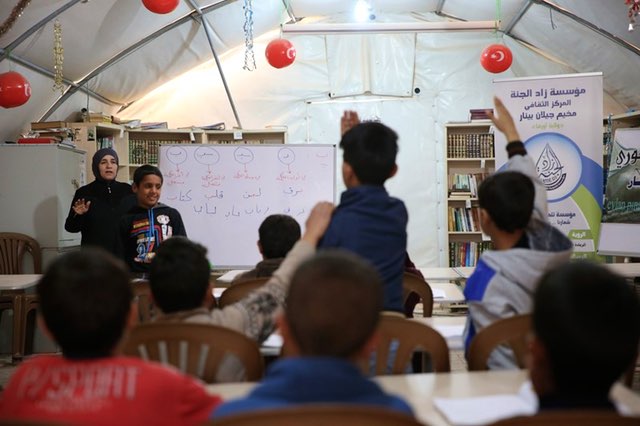A 21st-Century Response to the Refugee Education Crisis

Photo by Ensar Ozdemir/Anadolu Agency
The following article originally appeared on Refugees Deeply.
Tom Fletcher is Senior Adviser to the Global Business Coalition for Education.
When disaster hits, most of us watching feel powerless. We view the news with horror and sadness. We maybe donate to an NGO, or lobby our government to help. But much of our compassion doesn’t find a practical outlet.
Normally, some help does get through: food, shelter, the immediate humanitarian supplies needed. But education is rarely prioritized. It is seen as too complicated, less urgent, and a luxury rather than a lifesaving intervention. In recent years, the education sector has consistently received around 2 percent of all humanitarian financing.
And as a result, every year millions of children in emergencies are denied education.
But imagine if there was a different way to respond.
Ingenious humans have already created some of the most extraordinary technology to allow people to find a date, contact people on the other side of the world and access content.
What if we took all that technology and combined it with all that compassion? What if we were ready next time? And what if business led the way? Not with finance, but with practical help – supporting the education effort in the best ways it can.
The Global Business Coalition’s Rapid Education Action (REACT) database creates that potential for the first time. Launched in October 2016, the database already carries the names of over 40 companies that have pledged time, creativity and practical ideas to support the provision of education in conflicts, disasters and other crises.
Consultancies such as Boston Consulting Group are already providing advice to the Education Cannot Wait fund – a global fund for education in emergencies and protracted crises, launched last year – on how to develop projects in Syria, Yemen and Chad. Accenture and KPMG have schemes allowing employees paid time off to volunteer to help.
Companies such as the BMW Foundation have funded places at European universities to allow displaced students and faculty to continue their education.
Tech companies are also closely engaged in supporting refugee education. HP has created digital classrooms in Lebanon for those fleeing Syria to access the best possible education.
Google deployed Person Finder to help families locate loved ones. Microsoft has allowed people to use Skype to make free calls. Ericsson ran a project to reconnect refugees in Europe with their families. ITWORX Education is offering significant in-kind support – providing tablets and access to digital learning platforms for those hit by crisis. Endless has donated hundreds of computers to refugees in Jordan.
Other companies are providing the physical space in which to study. NRS International has pledged tents and shelter for schools. In Jordan, engineering companies are working with USAID and the Jordanian government to build new schools. Coalitions of companies, such as Techfugees, the UK Lebanon Tech Hub and Alt City, are bringing ingenuity and time to the challenge.
Pupils and their families also need access to finance. Money-transfer companies such as Western Union have made it easier to send financial support to those who need it to continue their education. And Mastercard has distributed prepaid debit cards to thousands of refugees.
Facebook is providing Wi-Fi connectivity to locations where refugees are based. Uber is providing free delivery of vital items, including books, for child refugees.
Refugee youth also need sustainable sources of income and the ability to receive relevant training in skills for the 21st-century job market. A partnership facilitated by the REACT database between NaTakallam and Re:Coded is using technology to create just such opportunities. As a member of REACT, NaTakallam is pairing displaced Syrians with Arabic learners around the world over Skype. This provides Re:Coded with the resources to pay refugees in Iraq as they train to become world-class software developers and links them to job opportunities.
But there is so much more we can do. Organizations working with refugees in the field are now sending REACT their specific requests for help. These include logistics networks to get essential education materials to children inside Yemen, Chad or Syria; I.T. support to help us connect businesses and individuals with global education challenges; places for displaced communities in apprenticeships and training schemes in Europe and the Middle East; and engineering support for building schools in Lebanon and Turkey.
We are now asking Education Cannot Wait, U.N. agencies and others on the front line of the education effort to tell us what help they need. I’ve spoken to extraordinary organizations working in Northern Kenya, Eastern Lebanon and Southern California who are looking for support for initiatives to get education through to the neediest areas in the world. Only with real, tangible requests can we find out if this new system can work.
We face the largest refugee and displacement crisis since World War II. Last year, the education of over 75 million children was disrupted by crisis and emergency – from the Nepal earthquake and ongoing conflict in Syria to the Ebola outbreak and the earthquake in Ecuador.
In the absence of action, children are trafficked, forced into child labor or married off at young ages. Young people are becoming frustrated at the lack of opportunity, making them vulnerable to extremism or violence.
Business can now be on the front line of the response, moving fast to help deliver education to displaced children. And if business can do it, maybe the next phase is to make it easier for individual citizens to offer their skills.
We are then on the way to a 21st-century response to these challenges. And the next Bill Gates, Albert Einstein or Marie Curie currently caught up in a crisis will go on to achieve his or her potential.
That is surely worth imagining.
